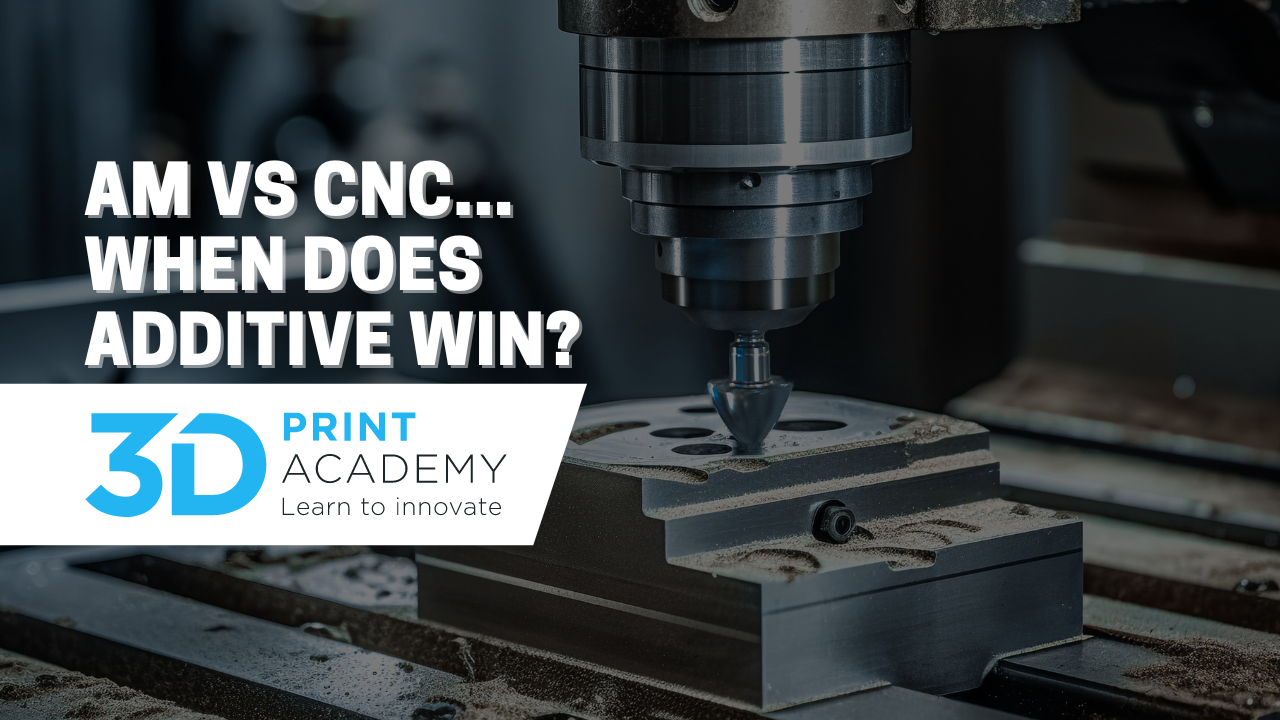Additive Manufacturing vs Computer Numerical Control (CNC) – When does AM win?
Posted on 2024/05/07

SHARE
Since the introduction of CNC in the 1950s, this ‘subtractive’ manufacturing technique has been the industry standard for machining metals and plastics. However, in recent years, the rise of additive manufacturing has challenged the status quo. Here are three key areas where additive manufacturing has the edge.
What is CNC machining and what is additive manufacturing?
The manufacturing disciplines of CNC and AM might share a common goal – to create the perfect component for the job, to the highest possible specification. But the two technologies achieve this through very different means.
CNC machines use a ‘subtractive’ process to create parts by removing material until the desired size and shape is reached. As implied by its name, the additive manufacturing process is the exact opposite – the part is built by adding material layer-by-layer using a 3D printer.
It’s best not to think of CNC and additive manufacturing as rivals. Parts created using computer numerical control still have their place. But there are at least three scenarios where the additive manufacturing process is plainly the better option, which we’ll guide you through below.
For custom parts and tooling
Typically, the need for a custom tool is discovered at short notice, often during the design process after fit and function testing. The design team will usually have to react fast, scrambling to create the one-off component from a niche material that isn’t readily available.
With CNC, there’ll often be a long lead time, derailing the design process, delaying the project, wasting time and therefore money.
Additive manufacturing is definitely a quicker, more adaptable, and cost-efficient way to create custom tools. With the agility of a 3D printer that can be minutely adjusted, and countless materials at your fingertips, cost and lead time are slashed, letting workflow continue uninterrupted and also producing less waste.
For complex parts and geometries
When a design calls for components with complex geometries, there’s no doubt that additive manufacturing has the edge. When using an FDM printer from the Stratasys brand, for example, AM not only lets you easily experiment with multiple iterations of the part, making tiny adjustments in the blink of an eye.
It also allows you to print with a specific amount of material, follow complex patterns, optimise the use of material and produce less waste than with CNC machining. The bottom line is, even with a sophisticated part, additive manufacturing is proven to be faster and cheaper.
For component labelling
In a fast-moving international business, keeping control of inventory is critical. Another major advantage of additive manufacturing over CNC is the ability to print unique labels on each component that leaves the production line.
With just a few touches on the 3D printer, you could add a barcode, SKU or other identifying data during the fabrication process, making it easy to track parts. With CNC, this would have to be done separately, adding another step to the build process and delaying time to market.
For guidance through the additive manufacturing process, contact our team
Intrigued by the AM concept but not sure where to start? At 3D Print Academy, we have helped many businesses understand the advantages of additive manufacturing. We have helped many businesses understand the benefits of additive manufacturing at 3D Print Academy.
Additionally, we have provided training to some of the UK’s top designers, developers, and operators. Our goal is to help them improve their skills and stay ahead in their respective industries. With state-of-the-art facilities, expert trainers and a full programme of AM courses from FDM 3D printer training to Polyjet 3D printer training, we’re the UK’s first Authorised Stratasys Training Centre.
Bring AM into your business with a 3D printing course from 3D Print Academy. We’re ready to help on 03332 075 660 or enquiries@3dprintacademy.co.uk
Book now or just need More Info?
Any questions or book one of our training courses please phone 03332 075660 or email enquiries@3dprintacademy.co.uk
